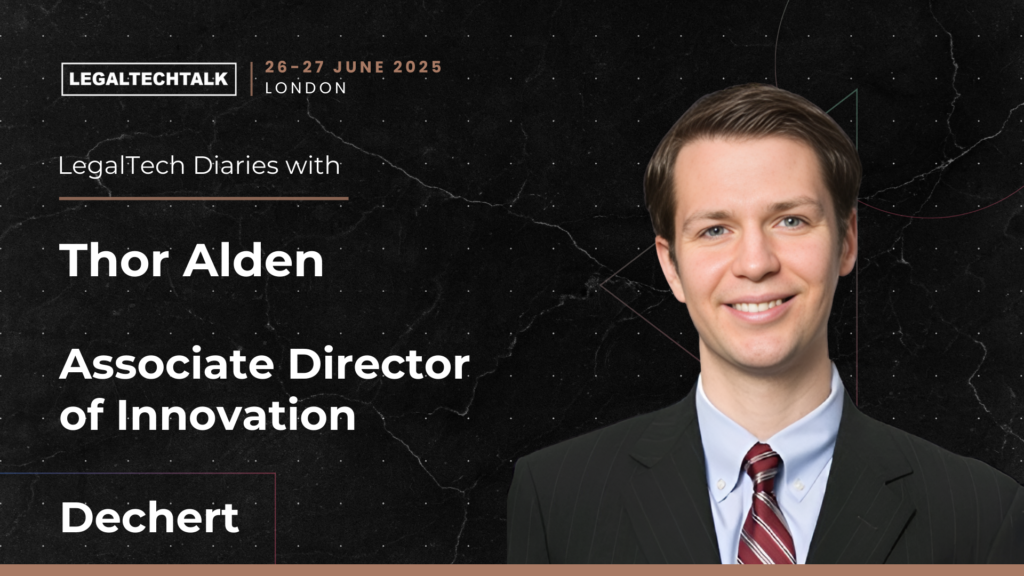In this interview, Thor Alden, Associate Director of Innovation at Dechert, discusses the firm’s AI suite with Charlotte Johnstone from LegalTechTalk. Thor showcases various tools including Summarizer and DocumentChat, highlighting their versatility and widespread adoption within the firm. He reveals that Dechert has seen nearly 200,000 uses of these tools, with applications ranging from meeting transcripts to large-scale document analysis in litigation. Thor emphasises the importance of customisation and security in their proprietary solutions. Mike Rinehart, CIO, adds insights on the firm’s “fail fast” approach to innovation, emphasising adaptability in tool selection. They also address client perspectives on AI use, noting varying levels of trust and the need for clear communication about AI applications in legal services.
Charlotte Johnstone: Can you share a little about some of the other tools in Dechert’s AI suite?
Thor Alden: ‘The most exciting part is our custom AI tools, where inputs are not viewable by third-parties, which allows us to use these tools on client matters. I can walk you through some of the generic ones, but there are also others that are confidential’, says Thor, explaining that for those tools, the firm is inputting proprietary data sets, ruling them out of being discussed for competitive reasons.’
Showing me some of the other tools at Dechert’s disposal, Thor opens one called ‘Summarizer’, where you can upload a document for it to summarise. ‘We have around 15 different document types we can upload into this, and some people upload audio files, using this to create meeting transcripts, summaries, or even ‘to-do’ items.’
‘The numbers on the usage of these tools has been skyrocketing, because we initially put the tool out there with just 3 or 4 use cases in mind, but there are maybe 100 uses that we didn’t even know about, which speaks to Mike’s point about giving people the tools to be creative and try new things.’
Charlotte Johnstone: How many use cases have you seen so far?
Thor Alden: ‘There are close to 200,000 uses with the tools so far. The most popular one is DechertMind, but that’s just because it’s been around the longest. The other really popular one is called DocumentChat – which is essentially where you can upload a document and then ask questions about it.’
Using LegalTechTalk 2024 as an example, Thor plugs the agenda for the orange stage into Dechert’s DocumentChat and asks ‘Are there any sessions that might be relevant for a GC?’
The DocumentChat comes back with options including ‘Aligning Law with Business and Social Transformation’, ‘Addressing the Digital Divide’ and ‘The Evolving Role of the GC’. ‘Whether the document is 4 or 400 pages, it doesn’t really make a difference, expect for the fact that it might take a little bit longer’, says Thor.
‘Where this tool comes to be a game-changer’, he adds, ‘is when you put this in scale. What we’ve done for a litigation project before is we have dozens, if not over 100, deposition transcripts in a huge matter. We need to know a set of say 30 questions – so we’ve connected this with a UI path robot which will go through the questions for each document – and it can go through about four 200 page documents in about an hour. As is, it can chug through around 100 documents in a day, answering all of those questions so that then you can have all of that data at your fingertips, and it’s all based on that ability to chat with documents, but on a larger scale.’
Charlotte Johnstone: What do you think is the most useful tool?
Thor Alden: ‘I think the most useful ones are DocumentChat, Summarizer and DraftDroid’, Thor says. ‘DraftDroid allows you to draft documents. For example, I could ask ‘which is my weakest argument, and can you give me thoughts on how to make it better?’
But it’s really about what you want to do with the tool. So far, we’ve launched over 20 tools, but we don’t have 20 today, and that’s because we’ve launched tools with the thought being that 1 in 3 of these might stick, and that some might fail.’
‘To be innovative, you have to fail fast’, adds Mike. ‘You have to move quickly to try things out and if they don’t work, you learn from it and move ahead. Part of the fail fast mentality is being able to realise when a vendor-packaged tool has provided a better product than what we’ve built already, in which case we’re happy to replace our one either in certain parts or entirely. Because of that, we’re signing short-term, nimble agreements, knowing that things are going to change rapidly and allowing us to adapt and bring in new tools/replace old ones.’
Charlotte Johnstone: How do the firm’s clients feel about the use of AI?
Thor Alden: According to Thor, ‘a lot of clients trust us to go for it – in a way, it’s no different than any other tool rolled out before. Other clients do say to be more careful. Some want prior approval or an explanation as to why we’re using it. Then, when we give them context, it makes sense to them.’
But, change is fun, asserts Mike. ‘It’s how we stay at the forefront of change, enhancing our legal services, gaining efficiencies and growing client value. It’s definitely challenging, but fun for sure.’
Read full LegalTech Diaries Volume 5: https://www.legaltech-talk.com/legaltechdiaries/volume-5/








